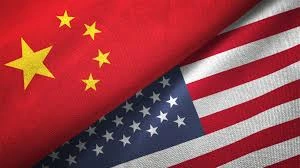February 18, 2025
The US China relations continues to face challenges, with increasing trade restrictions, geopolitical disputes, and diplomatic tensions creating instability in global markets. The latest developments in Taiwan policy, technology export bans, and retaliatory measures from China have intensified economic uncertainty. These shifts have also impacted the stock market, with investors reacting to policy changes and supply chain disruptions.
Taiwan Policy Shift: A Flashpoint in US China relations
One of the most significant recent developments in US China relations is Washington’s policy change regarding Taiwan. The U.S. State Department quietly removed a statement from its official documents that previously affirmed the U.S. does not support Taiwan’s independence.
China’s Response
China has strongly condemned this move, accusing the U.S. of violating the “One China” policy. Beijing has warned that such actions could provoke serious consequences, and can affect US China relations increasing tensions in the Taiwan Strait. The Chinese government has called on the U.S. to correct its “mistake” and reaffirm its stance on Taiwan.
Taiwan’s Perspective
On the other hand, Taiwan has welcomed this policy shift, seeing it as a step toward stronger U.S. support for its sovereignty. The move has strengthened diplomatic relations between Washington and Taipei, but it has also heightened the risk of military and economic retaliation from Beijing..
Trade War 2.0: New Restrictions and Economic Fallout

The economic battle had affected US China relations a lot which led to fresh trade restrictions. The Biden administration had previously attempted to ease some of the tariffs imposed by the Trump administration, but Trump’s return to office has brought a renewed push for economic sanctions against China.
Technology Export Bans
One of the biggest points of contention is the U.S. restricting semiconductor and AI technology exports to China due to disputes leading to US China relation issues. Companies like NVIDIA, Intel, and AMD have been affected, as their access to the Chinese market has been limited. These restrictions are part of Washington’s efforts to curb China’s advancements in artificial intelligence and advanced computing.
China’s Countermeasures
China has restricted exports of critical rare earth minerals, due to US China relations disputes which are essential for semiconductor manufacturing, electric vehicles, and other high-tech industries. The country is also investing heavily in domestic semiconductor production to reduce reliance on American technology.
Stock Market Turbulence: How Investors Are Reacting
U.S. Stock Market Impact
The ongoing diplomatic US China relations have led to volatility in U.S. stocks and its financial markets. Major indices such as the S&P 500 and the Nasdaq have fluctuated based on trade developments.
Technology Stocks Decline: Due to US China relation issues, Companies like NVIDIA, AMD, and Qualcomm have seen declines due to concerns over reduced sales in China.
Tesla’s Challenges: Tesla’s stock has dropped after reports that China is delaying approvals for its self-driving technology, likely as a bargaining chip in trade negotiations.
Uncertainty in Manufacturing: U.S. manufacturers that rely on Chinese supply chains, such as Apple and Boeing, have faced stock price fluctuations.
Chinese Stock Market Reaction
While U.S. markets have experienced uncertainty due to us China relation disputes , Chinese stock markets have had mixed reactions.
Tech Sector Rebounds: Despite initial losses due to U.S. sanctions, Chinese tech stocks such as Alibaba, Tencent, and Baidu have rebounded after President Xi Jinping reassured business leaders of government support.
Hang Seng and Shanghai Composite Indices: The Hang Seng Index in Hong Kong gained 1.64%, while the Shanghai Composite saw smaller gains of 0.15%.
State-Backed Investments: The Chinese government has increased investment in its domestic tech industry, aiming to become more self-sufficient in chip production.
Supply Chain Shifts: Companies Move Production Out of China
The “Anything But China” strategy is driving global companies to shift manufacturing away from China. India and Vietnam are benefiting as companies like Apple and Samsung expand production there. Mexico is also gaining importance due to its proximity to the U.S. and favorable trade agreements, especially with stricter tariffs on Chinese imports.
The shift away from China as a manufacturing hub is altering global supply chains. While this benefits countries like India, Vietnam, and Mexico, it also creates short-term disruptions, leading to delays and increased production costs.
Conclusion
The strained US China relations continues to affect the global economy. While the trade war and policy changes have created challenges, they have also prompted companies to rethink supply chains and investment strategies.
As the world watches how these tensions unfold, businesses and financial markets must prepare for ongoing uncertainty, ensuring that they remain adaptable in an increasingly complex global economy.



